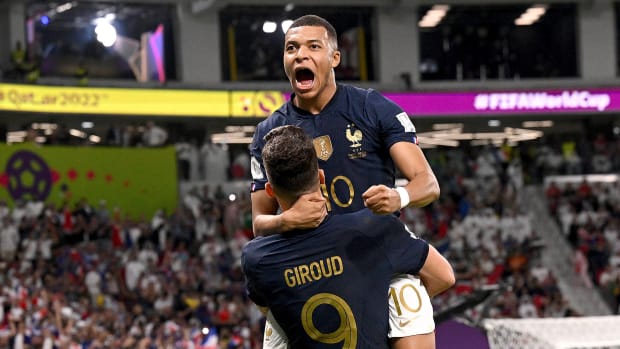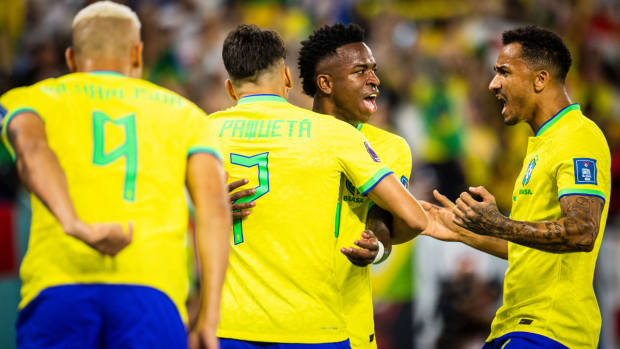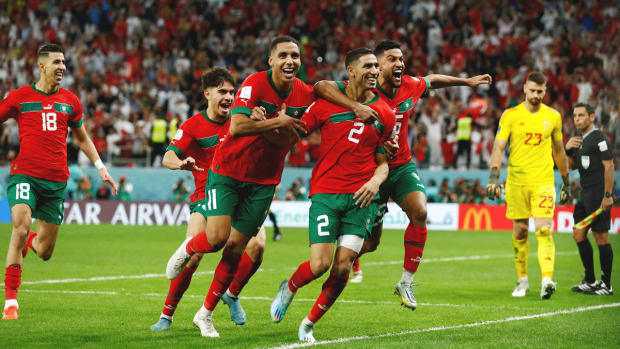AL RAYYAN, Qatar — Saudi Arabia stunned Argentina on the third day of the tournament. Then Japan beat Germany, Tunisia held Denmark and Canada outplayed second-ranked Belgium in an unlucky loss. It seemed at that point like this unconventional World Cup—crammed into the middle of the European club season with scant time to prepare, and into this tiny country with scant soccer tradition—would deliver a historic haul of surprising results.
And it has, as long as one understands what constitutes a “surprise” in the elitist environment of FIFA’s World Cup. If you’re looking for a revolution, look elsewhere.
It’s noteworthy that African teams have already won six matches here in Qatar. That’s a record (four was the previous high). And it’s significant that six nations from beyond the Europe–South America duopoly that dominates the global game were among the last 16. That’s also a record. The second round featured teams from five confederations and six continents (Australia plays as an Asian side).
“There are no more small teams and no more big teams,” FIFA president Gianni Infantino said here. “This shows that football is really becoming truly global.”
He’s kind of right about the second part. Regarding the first, the quarterfinal bracket says otherwise.

Michael Kienzler/Ulmer/Teamfoto
This is the stage of the competition where pretenders are typically cast aside. Morocco’s stirring run to the quarters, which kick off Friday, has been the talk of the first Arab World Cup. Footage of delirious fans celebrating from Doha to London has circled the globe. The Atlas Lions were done no favors by the draw. They faced second-ranked Belgium and 2018 finalist Croatia in the group stage, then traditional power Spain in the round of 16 (three of the top 12 in FIFA’s ranking).
But the hype and happiness that’s greeted their advancement is testament to how rare it is. If the Arab world is united behind Morocco, it’s because no team from that part of the planet has ever come this far. And if African fans feel similar, it’s because CAF nations have reached the last eight on only three previous occasions.
“A lot of fans came to Qatar to support the team from lots of countries—America, Europe, Morocco. They love their country,” Morocco coach Walid Regragui said Tuesday after his Lions ousted Spain on penalty kicks. “I am very proud of my fans, of my people, and Arab people too, because I think we have Qatari people here, maybe Algerian people, Tunisian people, Arab people and African people. Morocco has a lot of countries behind them to make history.”
The task is a tall one. Morocco’s quarterfinal opponent Sunday, Portugal, is a talent-rich power boasting world-class players like Bruno Fernandes, Bernardo Silva, João Félix and, sometimes, international soccer’s all-time leading scorer, Cristiano Ronaldo. It’s a recent European champion (2016) that just blasted Switzerland by five goals in the second round. And after Morocco, Portugal is the least decorated Word Cup nation remaining.
Quarterfinalists Brazil, Argentina, France and England are among the eight countries that have lifted the trophy. The Netherlands is a three-time finalist and one of football’s most important and innovative countries, and Croatia is a tournament-tested side and 2018 silver medalist captained by Luka Modrić, a former world player of the year.
It’s hard to miss the “VVIP” signs while traveling to and around World Cup stadiums. This is an event that caters to the elite. Morocco is crashing a very exclusive party.
The ceiling appeared to be shattering in 2002, the last time the World Cup was played in Asia. That summer in Japan and South Korea, the Senegalese, Americans and South Koreans all advanced to the quarterfinals. While the U.S. was thrilled with the chance to play and defeat archrival Mexico in the second round, the wins by Senegal and South Korea seemed more statistically significant: They each beat a European side to go through. Senegal outlasted Sweden, and Korea shocked Italy on golden goals. The World Cup cohost then beat Spain on penalties to become the first Asian side in the final four.
It was a false dawn. As money and power continued to consolidate around the most prominent Western European clubs, the players developed or imported to those teams became the biggest beneficiaries of that tilted playing field. At the World Cup, Europe and South American wrested back control. In the five tournaments since 2002, only three of the 40 quarterfinalists have been from Concacaf, Africa, Asia or Oceania. Those five confederations constitute almost 70% of FIFA’s membership.

Moritz Mueller/Imago Images
To further illustrate how difficult closing that gap is, none of those three actually outscored a European or South American team to reach the last eight. Morocco and Costa Rica (over Greece in 2014) won on penalties, and Ghana beat the U.S. in extra time in ’10. And that’s it. For those U.S. fans frustrated by the Americans’ failure to move beyond the round of 16 since ’02—essentially no one else has, either. No country from outside international soccer’s ruling dyad has earned anything more than an ephemeral seat at the table.
Costa Rica’s Cinderella run in Brazil not withstanding, the U.S. and Mexico are the long-term kings of Concacaf. But the gap between them and the contending elite remains large. El Tri famously lost in the round of 16 seven consecutive times before opting to leave early and just avoid that agony altogether in Qatar. The U.S. has won one of 19 games against European teams since returning to the World Cup in 1990. And it beat Colombia on home soil in ’94 thanks partially to Andrés Escobar’s famously tragic own goal.
It doesn’t take much to expose the rift. Speaking after the Americans’ round-of-16 loss to the Dutch on Saturday, U.S. coach Gregg Berhalter lamented his side’s mistakes, saying, “It’s just moments that a player's off a little bit here or there, and it ends up in the back of the net. When you play at this level, when you play this high quality, that’s what happens.”
The U.S. will keep trying, of course, and there’s hope for the future thanks to the national team’s youth and the increasing domestic development and foreign transfer interest in American prospects. But plenty of other countries outside Europe and South America have invested in the game and/or have deep-rooted football cultures and still haven’t been able to batter down that quarterfinal door.
Morocco is one of them. Organized soccer began there more than 100 years ago, and its professional league has been up and running since 1956. Only Egyptian teams have won more African club championships. The Atlas Lions have probably underachieved considering the country’s love affair with the sport, however. Morocco has won a single African Cup of Nations (’76) and has finished in the top three only once in the past 40 years. It played well but went winless at the World Cup four years ago in Russia, its first since ’98. It then took a giant leap here.

Mutsu Kawamori/AFLOSPORT/Imago Images
Ironically, Europe helped make it happen. Twenty of Morocco’s 26 World Cup players are at European clubs, including those from all “Big Five” domestic leagues. In addition, 13 Atlas Lions were born in Europe. Regragui’s squad features natives of France, Belgium, Spain, Netherlands and Italy (shootout hero Yassine Bounou, the goalkeeper, was born in Montreal but raised in Casablanca). Star winger Hakim Ziyech, 29, was born in Dronten, Netherlands, about 45 miles east of Amsterdam, to a Moroccan mother and Dutch father. Now at Chelsea, Ziyech played for Dutch youth teams until switching to Morocco in 2015. Morocco’s other big name, Paris Saint-Germain defender Achraf Hakimi, was born in Madrid to Moroccan parents. He came up through Real Madrid’s academy. Regragui, the manager, is from the Paris suburbs.
Morocco has become stronger because of its diaspora, the unique perspectives on the game that affords, and the strong connections those families maintained with their homeland, Regragui said.
“Before this World Cup, we had a lot of problems with the guys born in Europe and the guys born in Morocco,” he said following the Spain game. “A lot of journalists here have also said, at times, that these guys don’t like or love Morocco. ‘Why don’t you play with the guys born in Morocco?’ And today, I think it shows to the world that every Moroccan is Moroccan, no matter their passport. When you come to the national team, you want to die and fight and that is what I wanted to show.
“Every country has its football culture. So you make a milkshake and with that, you get to the quarterfinals.”
It’s an achievement worth celebrating, and it has been here in Qatar. The question is whether that achievement will ever be realistically repeatable. Senegal, Ghana and Costa Rica haven’t made it back. The Americans and Mexicans can’t break through. And while countries like Morocco try to leverage the quality and power of European clubs against UEFA’s national teams (as the U.S. is doing with its young cohort abroad), the entrenched powers are also looking for new ways to maintain their advantage.
The length of the leap between the round of 16 and the quarterfinals is such that the Dutch seemed to coast through the group stage and then past the tired Americans, who’d spent everything just to get that far. Netherlands coach Louis van Gaal summed it up Thursday as he spoke ahead of his team’s mouthwatering quarterfinal tilt against Argentina. He said he didn’t want to “detract” from past opponents, but acknowledged, “Het toernooi begint morgen eigenlijk pas echt voor ons.”
“The tournament actually starts for us tomorrow.”







